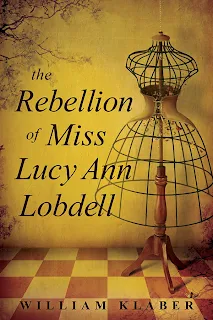Lucy lived at a time when women did not commonly travel unescorted, carry a rifle, sit down in bars, or have romantic liaisons with other women. Lucy did these things in a personal quest—to work and be paid, to wear what she wanted, and to love whomever she cared to. But to gain those freedoms she had to endure public scorn and wrestle with a sexual identity whose vocabulary had yet to be invented. Lucy promised to write a book about it all, and over the decades, people have searched for that account. Author William Klaber searched also until he decided that the finding would have to be by way of echoes and dreams. This book is Lucy’s story, told in her words as heard and recorded by an upstream neighbor.
The Rebellion of Miss Lucy Ann Lobdell - Kindle ebook by William Klaber
One
day in 1855 Lucy Lobdell cut her hair, changed clothes, and went off to
live her life as a man. By the time it was over, she was notorious. The
New York Times thought her worthy of a lengthy obituary that began
“Death of a Modern Diana . . . Dressed in Man’s Clothing She Win’s a
Girl’s Love.” The obit detailed what the Times knew of Lucy’s life, from
her backwoods upbringing to the dance school she ran disguised as a
man, “where she won the love of a young lady scholar.” But that was just
the start of the trouble; the Times did not know about Lucy’s arrest
and trial for the crime of wearing men’s clothes or her jailbreak
engineered by her wife, Marie Perry, to whom she had been married by an
unsuspecting judge.
Lucy lived at a time when women did not commonly travel unescorted, carry a rifle, sit down in bars, or have romantic liaisons with other women. Lucy did these things in a personal quest—to work and be paid, to wear what she wanted, and to love whomever she cared to. But to gain those freedoms she had to endure public scorn and wrestle with a sexual identity whose vocabulary had yet to be invented. Lucy promised to write a book about it all, and over the decades, people have searched for that account. Author William Klaber searched also until he decided that the finding would have to be by way of echoes and dreams. This book is Lucy’s story, told in her words as heard and recorded by an upstream neighbor.
Lucy lived at a time when women did not commonly travel unescorted, carry a rifle, sit down in bars, or have romantic liaisons with other women. Lucy did these things in a personal quest—to work and be paid, to wear what she wanted, and to love whomever she cared to. But to gain those freedoms she had to endure public scorn and wrestle with a sexual identity whose vocabulary had yet to be invented. Lucy promised to write a book about it all, and over the decades, people have searched for that account. Author William Klaber searched also until he decided that the finding would have to be by way of echoes and dreams. This book is Lucy’s story, told in her words as heard and recorded by an upstream neighbor.

